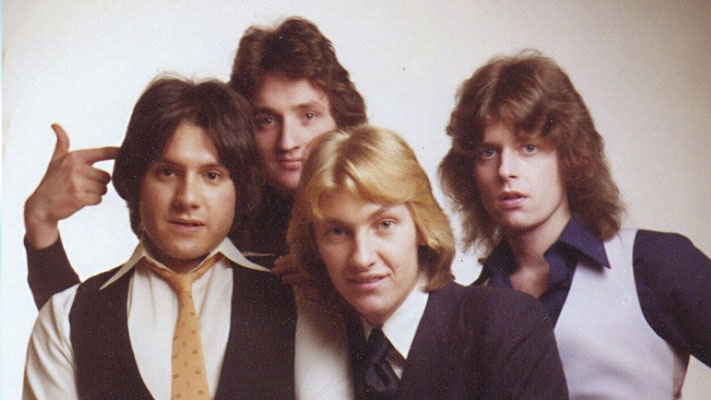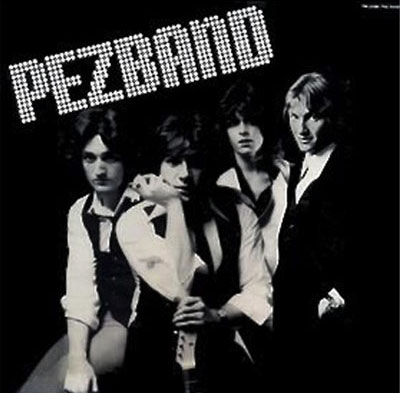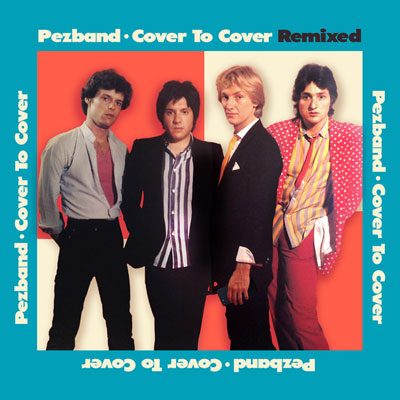PEZBAND

Pezband promo photo, 1976
Revisiting Midwest Power Pop
Mimi Betinis interview by Robert Pally
(June 2022)
Mimi Betinis was the singer and guitarist of the legendary late 70's Chicago power pop band Pezband, who released three albums then. In the interview, he talks about what success means form him, why he became a musician, highlights with Pezband (including the later day release of their lost album Women & Politics in 2016), the band's reunion, his solo albums and some possible new Pezband material.
PSF: Was music important in your family?
MB: Yes, very much so. My mother often had the record player going with the likes of Vivaldi spanning to Edie Gorme and The Trio Los Panchos. My mother and my little sister played piano, which is how I learned piano, and my stepfather played guitar. I started out learning French Horn in grammar school and my little brother played the tuba for a spell.
PSF: Do you remember the first LP or Single you bought?
MB: I heard "I Wanna Hold Your Hand" (Beatles) in January of '64 and promptly ventured out in freezing weather to buy it. It was the most exciting thing that I had ever heard. Before that, I listened to quite a bit of classical music.
PSF: What made you wanna become a musician?
MB: I think it was something that just happened naturally to me. At a young age, music and art came easily to me and I kept at. And I haven't stopped.
PSF: Did your parents support your wish to become a musician?
MB: Not at first. My mother wanted me to become an art teacher (which I did after Pezband disbanded) but when the group started making headway and eventually got signed, my parents were very supportive.
PSF: What was the first band you played in?
MB: My first group was called The Time. It consisted of three grammar school friends and myself. We played the current rock hits of 1966 as best we could. We would do renditions of The Yardbirds, The Kinks and The Animals. Our engagements were limited to backyard parties, coffee houses, and high school dances. It was a lot of fun for us. The worst memory I have was struggling to play my Gibson 330. The problem was I was too short and the guitar too big!
PSF: What was the first song you wrote and what was it about?
MB: My first song was called "Somewhere." It was, of course, about a girl I had a big crush on and she was having a great time with someone... SOMEWHERE, without me!
PSF: What elements must a good pop song have for you?
MB: I think it must be short and to the point with hooks, melody, simple lyrics, and musical craftsmanship. It has to do something for your soul.
PSF: What led to the forming of Pezband?
MB: The group formed just after high school as a sort-of jam band. It was initially called Pez because I liked the way the letters looked together. P..E..Z.. was an unusual line-up of letters. The original lineup was Mick, Mike, John, and my self, we were all from Oak Park, IL and played very well together. I also loved the Pez candy which was imported from Austria, I believe.
PSF: What was the highlight with Pezband?
MB: Well, we had many wonderful things happen to us. For example, in 1977, we played the ABC/Dunhill record convention in Delaware and were named "the most promising act" of the year. Later that year we were featured on The Today Show with Jane Pauly as the latest music kids were listening to. In November of '77, we were jetted off to London to record our second LP at Moulin Rouge Studios, London. That studio was owned by Jethro Tull. It was a big deal to be there. Many top session players were on board with us in the studio. We also recorded a live EP at a club called Dingwalls. It was released on Radar Records and got into the top ten import charts.
PSF: "Baby It's Cold Outside" is probably your best-known song. What triggered the writing of this song?
MB: This song was by and large put together from past experiences with girls. When the girl cuts you out of her circle, it's cold outside. And the guy, in this instance is hurt and fed up with her. It was just a chord progression that Tommy and I came up with. I put the melody and lyrics down once the chord progression was solid.
PSF: Apparently, Pezband was the first US band that had a cover designed by the famous company Hipgnosis. What triggered that?
MB: While we were in London, the record label president, Marty Scott, made some sort of deal with them and got us connected. Like everything is the music business world, it was about who you knew and how much money you had.

PSF: What triggered you becoming the not only guitarist but also singer of Pezband?
MB: I was the initial singer and lead guitarist of the group when we started out in 1972. After going through a couple of other singers along the way years earlier, I went back to my former job with the encouragement from the guys in the group, our manager (Mike Lembo), and the Passport label. We had a couple of other singers but they didn't really work out.
PSF: Which is your favorite Pezband album and why?
MB: That's very difficult to answer because so much time and effort were invested in each recording and I like them all. I think each LP has some noteworthy songs. I think I would lean more toward the first LP because it had a great cover photo of the group and a slick studio production.
PSF: Did you feel with Pezband as a part of the power pop scene in Chicago or was that just a thing of the music press?
MB: No, not at all. In our time, we were part of the contemporary rock sound, that's what we identified with. We were labeled as power-pop by our marketing department at Passport Records. It was a novel idea at the time that stuck. Later on, the music press picked up on it and uses it to this day. We were the first national act to be labeled as a power-pop group. Now, it's used for any pop group that has that type of sound. That term has been retro-fitted to include great bands such as Badfiger, which were one of our favorites.
PSF: Your last album with Pezband was called Women & Politics. How come you called it like this?
MB: Mick came up with that title because the songs we had recorded dealt with those two topics- girls and politics.
PSF: What were the reasons that Pezband split?
MB: There were several things going on at the time. The music sense was changing rapidly. We were up against the disco monster and that trend hurt groups like ours. The money from the label ran out. We had no more support so they let us go. We were not selling a huge amount of records too. That didn't help. In 1978 we were touring all over the east coast and opening shows for Fleetwood Mac, Supertramp, Rush, Blonde, and doing countless radio interviews. We also did a T.V. show in upstate New York and recordings at Bearsville Studio in Woodstock, New York. When we got back to Chicago in 1979, playing small clubs and that sort of thing was discouraging because we were really going places fast when we lived on the East Coast for those two years. I started to lose interest in continuing with the whole thing.
PSF: What did you do musically after 1983 and before 2006 when Pezband first reunited?
MB: I continued to write and record material off and on for several years. Then, I went back to art school, got a couple of art degrees worked as an illustrator for the Field Museum of Natural History, and taught art in the Chicago Public School system for many years.
PSF: What triggered the reunion?
MB: Mick and I got together and wrote some songs at some point. We ended up recording a few at a studio in town down Chicago named Wall to Wall recording. There are several recordings from those sessions which still have to be mixed.
PSF: In 2010, your first solo album All That Glitters appeared. What led to that?
MB: I have a good amount of material that I have accumulated over the years and I felt that some fans might like to hear some of my songwriting.
PSF: Looking back what do you think of it?
MB: I think that All That Glitters has some good tracks on it and I think that some of the material could have been better developed. One of my favorites is John Lennon's "Across The Universe."
PSF: Six years later, you followed up with Music Sounds. What song is your favorite from this album?
MB: My favorite number on that disc is "Pontiac." It is an autobiographical song about one of my many excursions to California in search of fame and fortune. I also like "Summer Love '68" which was written about my girlfriend of the time and she was quite a dish too!
PSF: How did you want to make your solo work different compared to Pezband?
MB: My solo recordings incorporate many acoustic instruments which I have accumulated over the years. Besides owning lots of acoustic and electric guitars, I collect all sorts of noise-making items, such as bells, percussion, and oddball instruments. The Pezband recordings are high-powered electric guitar passages that don't use many of these instruments. So, in my solo efforts, I try to use diverse instrumentation. In both recording applications, experimentation is and was key.

PSF: What means success to you?
MB: Being happy. If happiness is not there, what's the use?
PSF: What musical plans do you have for the future?
MB: I am working on more solo material and I am working on a Best of Pezband CD with producer, John Pavletic. These will be tracks from LP 1, LP 2, LP3, and some from the live EP's. Both will be released next year.
PSF: Music changed your life by...?
MB: Providing an avenue by which I could, explore, create and vent.
Discography:
Pezband
United Technique 1972 (2017) The First Studio Demos
Pezband (1977)
Laughing In The Dark (1978)
Thirty Seconds Over Schaumburg (1978) 5-Track LP
Two Old Two Soon Live At Dingwalls! (1978) 4-Track Live-LP
Cover To Cover (1979)
4 Song EP (1995)
Dangerous People -Unreleased Tracks & Demos 1979 (2013)
Women & Politics (2016) 4-Track EP
Mimi Betinis solo:
All That Glitters (2010)
Music Sounds (2016)
Basement Tapes Vol 1 (2016)
Also see the Pezband wetbsite